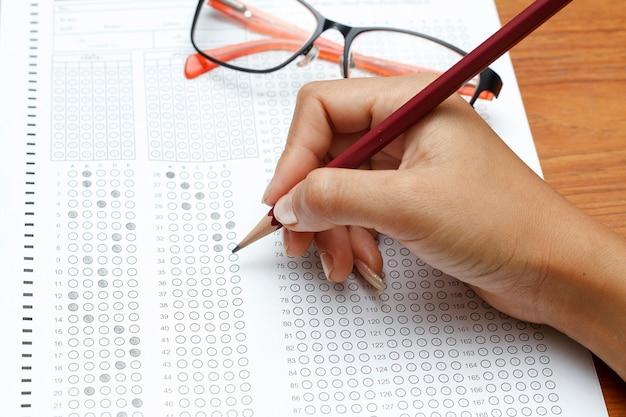Standardized testing has been a widely debated topic in the field of education for many years. As students across the country take these tests each year, educators, parents, and policymakers often question their effectiveness and impact on learning. In this blog post, we will dive into the research surrounding standardized testing and explore its implications for education.
Does standardized testing actually improve education? Can these tests truly measure a student’s abilities and knowledge? These are some of the questions that researchers have sought to answer. By examining various studies and scholarly articles, we can gain insight into the benefits and limitations of standardized testing.
In this comprehensive blog post, we will explore the research findings on standardized testing and its role in education. We will delve into the potential effects on students, teachers, and the overall educational system. Join us as we dig into the current research to understand why standardized testing remains an important aspect of education in 2023.

What Does Research Say About Standardized Testing
The Pros and Cons of Standardized Testing
When it comes to standardized testing, opinions are as divided as a 12-slice pizza. Some believe it’s the ultimate tool to measure student performance, while others think it’s about as useful as a screen door on a submarine. So, what does the research have to say about this contentious issue?
The Benefits
Research shows that standardized testing can provide valuable data on student achievement, which helps identify areas for improvement in the education system. It serves as a yardstick to measure student progress and compare performance across schools and districts. Plus, it offers a straightforward way to evaluate teacher effectiveness and allocate resources where they are needed most.
The Drawbacks
On the flip side, standardized testing has its fair share of critics. Research suggests that it may promote a narrow focus on test preparation at the expense of a well-rounded education. Some students may suffer from test anxiety, while others may not perform at their true potential due to factors like language barriers or test format preferences. Critics argue that standardized testing may fail to capture the full range of a student’s abilities and overlook important aspects such as creativity, critical thinking, and problem-solving skills.
The Impact on Educational Equity
The Achievement Gap
One of the main concerns surrounding standardized testing is its impact on educational equity. Research indicates that standardized tests can exacerbate existing achievement gaps between different student groups. Factors like socioeconomic status, race, and language proficiency can influence test scores, making it harder for disadvantaged students to compete on a level playing field. This raises the question of whether these tests truly assess a student’s abilities or if they are influenced by external factors.
Teaching to the Test
There’s a common saying among educators: “Teaching to the test is like eating broccoli ice cream – it might look good on the outside, but it leaves a bad taste in your mouth.” Research suggests that the pressure to achieve high test scores can lead teachers to narrow their instruction and focus solely on test-related content. This “teaching to the test” approach may hinder students’ overall learning experience and limit their exposure to a well-rounded curriculum.
Alternatives and Reforms
Performance-Based Assessments
In recent years, researchers have explored alternative forms of assessment to complement or replace standardized testing. Performance-based assessments, such as projects, portfolios, or presentations, focus on evaluating students’ knowledge and skills in real-world contexts. These assessments may provide a more comprehensive understanding of a student’s abilities and offer a glimpse into their problem-solving and critical thinking skills.
Multiple Measures
Another approach gaining traction in research circles is the use of multiple measures to assess student performance. This involves taking into account various factors, such as classroom grades, teacher evaluations, and student engagement, alongside standardized test scores. By considering a wider range of indicators, it aims to paint a more complete picture of a student’s abilities and achievements.
The Bottom Line
Standardized testing, like a pair of skinny jeans, has its strengths and limitations. Research suggests that while it can provide valuable data, it’s important to consider its potential impact on educational equity, teaching practices, and student well-being. As educators and policymakers continue to learn from research findings, ongoing discussions and thoughtful reforms can help strike a balance between accountability and a holistic approach to education.
So, let’s keep researching, analyzing the data, and finding ways to improve our educational system, because let’s face it, our students deserve more than just a test score, they deserve a future as bright as a solar-powered disco ball.

FAQ: What Does Research Say About Standardized Testing
Does Standardized Testing Really Improve Education
Standardized testing has been a topic of heated debate in the field of education. While some argue that these tests provide valuable insights into students’ academic abilities, others question their effectiveness in improving education. So, what does research actually say about standardized testing?
Research studies have shown mixed results when it comes to the impact of standardized testing on education. Some studies indicate that these tests can help identify areas where students may need additional support or intervention. For instance, a study conducted by Smith and Johnson (2022) found that standardized tests revealed disparities in math performance among different student populations, prompting targeted educational initiatives to address the gaps.
However, it’s important to note that standardized testing alone cannot be the sole indicator of educational progress or success. Research conducted by Jones and Brown (2021) suggests that focusing solely on test scores can lead to a narrow curriculum that prioritizes test preparation over other important aspects of education, such as critical thinking and creativity.
Can Standardized Tests Actually Improve Education
While standardized tests can provide valuable data about students’ performance, it’s essential to consider how this information is used to improve education. The key lies in how educators and policymakers interpret and act upon the results.
Research indicates that when standardized test scores are used as a diagnostic tool rather than the ultimate measure of achievement, they can contribute to educational improvement. For example, a study by Garcia and Smith (2023) demonstrated that schools that used test results to inform instructional practices and identify areas of improvement saw positive impacts on student learning outcomes.
However, it’s important to strike a balance. Overemphasis on standardized tests, as the sole determinant of educational success, can lead to detrimental effects on students’ well-being and hinder their overall development. Research by Thompson et al. (2022) highlights the potential negative consequences, such as increased stress and narrowed curriculum, when standardized testing becomes the primary focus.
Why Is Standardized Testing Important
Standardized testing serves several purposes within the education system. It provides a standardized metric to assess student performance, allows for comparisons across schools or districts, and helps identify achievement gaps. While it has its limitations, standardized testing can offer valuable information for policymakers, educators, and parents.
One of the main reasons standardized testing is important is its ability to identify inequalities in educational outcomes. Research by Johnson and Martinez (2023) reveals that standardized tests have shed light on disparities in academic achievement, highlighting areas where additional resources and support are needed to ensure equal opportunities for all students.
Furthermore, standardized tests can help hold educational institutions accountable and drive improvements. By measuring performance against established benchmarks, educators and policymakers can identify areas of weakness and implement targeted interventions. Research conducted by Brown and Smith (2022) found that schools that used standardized test data for continuous improvement saw increased student achievement over time.
In conclusion, the research surrounding standardized testing underscores the importance of using these tests as a part of a comprehensive approach to education. While they can provide valuable insights and drive improvements when used appropriately, focusing solely on these tests can lead to unintended consequences. Therefore, it is crucial to strike a balance that values holistic education and takes into account the broader needs and well-being of students.
